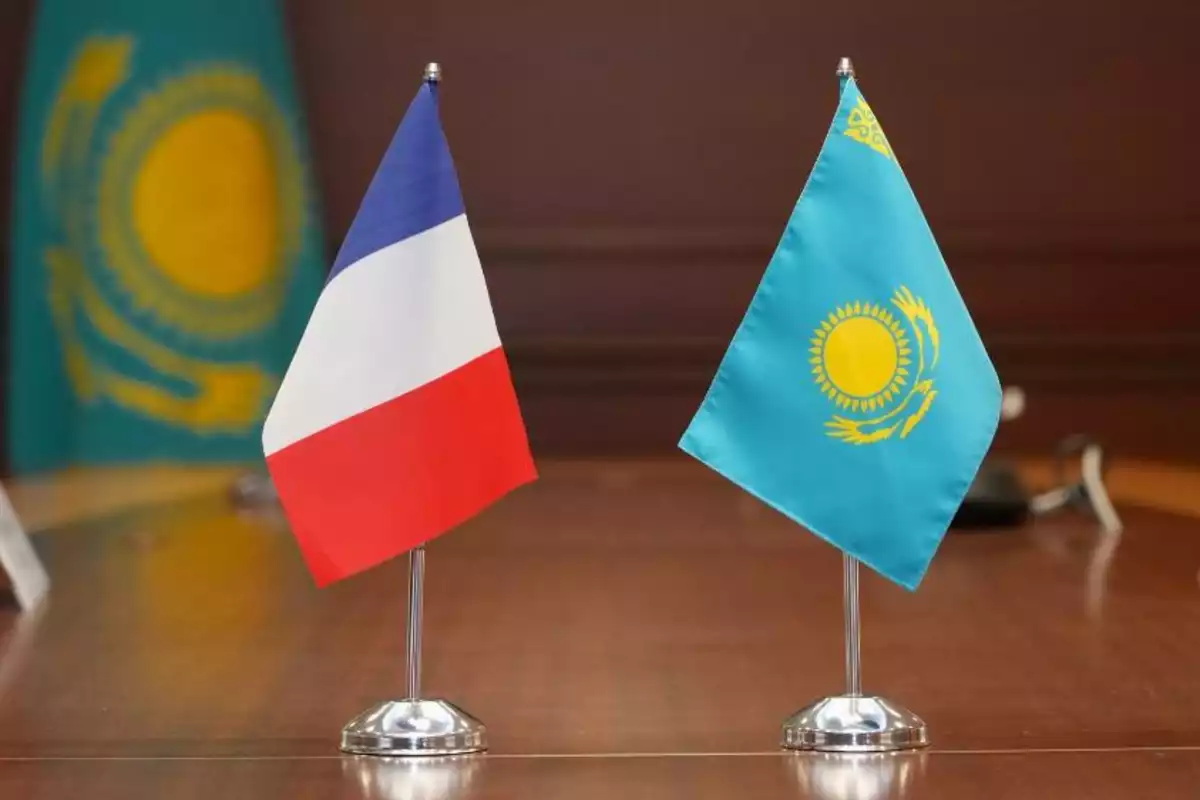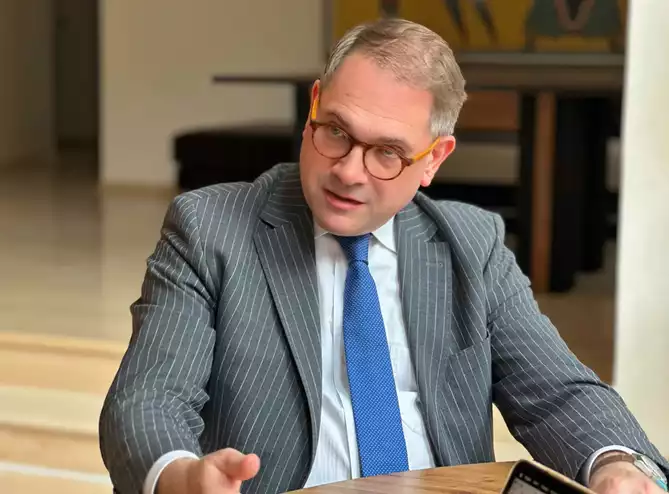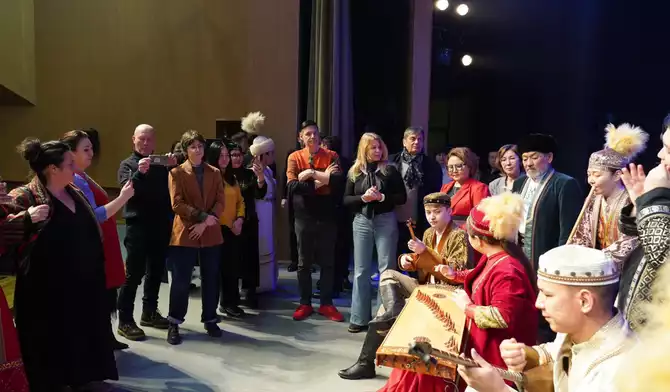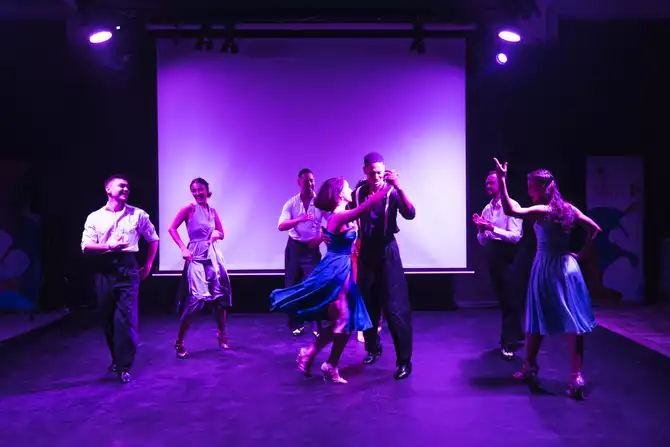
Photo: Ministry of Transport of the Republic of Kazakhstan
Amid rising global tensions and changing alliances, France and Kazakhstan are forging a relationship marked by stability, mutual respect, and strategic significance.
Anchored in a shared commitment to multilateralism, the relationship has gained new momentum through recent reciprocal presidential visits and a widening scope of cooperation, from water security and nuclear energy to artificial intelligence and creative industries, The Caspian Post reports citing The Astana Times.
In an exclusive interview with The Astana Times, French Ambassador to Kazakhstan Sylvain Guiaugue discusses how the two countries align their visions for the future-blending diplomacy with innovation, and soft power with strategic priorities-to co-create solutions for global and regional challenges.

French Ambassador to Kazakhstan Sylvain Guiaugue. Photo credit: The Astana Times
High-level visits between Kazakhstan and France have intensified in recent years, culminating in President Kassym-Jomart Tokayev’s visit to Paris in November 2024. How do these regular meetings advance bilateral cooperation, and what broader political and strategic signals do they send to the international community?
Each meeting is an excellent deadline for our two countries to advance different topics in the economic, cultural, and institutional spheres. This is also an opportunity to send a political signal, first of all, that our two countries share a common view and understanding on many topics. It is also a political signal to our partners that France is interested in growing its presence in Central Asia, particularly in Kazakhstan, and that Kazakhstan pays attention to developing its relationship with the EU and with France in particular. We are living in difficult, unstable times, and each of our countries has a strong commitment to multilateralism. It is important these days, where there are many question marks regarding stability and diplomatic relationships between different countries, to reaffirm a strong commitment to multilateralism, to respect international law, and to uphold the rule of law. So our two countries are very much engaged in recalling the importance of multilateralism in these dynamic times, both bilaterally and multilaterally.

The Festival d’Avignon delegation meeting with Kazakh theater troupes in February this year. Photo credit: Embassy of France in Kazakhstan
From an economic perspective, for a country like Kazakhstan, would you say the 12 interdepartmental agreements and $2.2 billion in commercial contracts signed during the Kazakh-French Business Council last November in Paris meeting represent a significant milestone, or is this more of a starting point, with even greater potential ahead?
We are in a continuous and growing trend in our relationship. Trade between France and Kazakhstan exceeded 5 billion euros (US$5.6 billion) last year, and exports from France to Kazakhstan are also increasing. Kazakhstan is a major provider of hydrocarbon resources for France, including oil, gas, and uranium, which are crucial for our energy needs. So, the trend is clearly upward. What happened last November in Paris was, I would say, a snapshot - a very positive state of play - in this growing dynamic. My main task is to keep that momentum going, month after month. France is one of Kazakhstan’s key partners: a major investor, an important client, and a significant supplier as well.
It is definitely a growing trend. When you mention all the signings that took place in Paris, some of them are actual contracts, and some are simply promises or declarations of intent. A big part of my job is to turn those promises and intentions into real contracts, real engagement, real commitments. Since last November, I’ve seen this trend continue, especially in the health sector. There are delegations traveling both ways, from France and to France, and we are seeing more and more prospects becoming concrete. So yes, this is a very positive trend. These political meetings are important because they send a strong signal to our respective governments and administrations that there is a commitment at the highest level. That encourages everyone to work in the same direction.
Last year’s One Water Summit, co-chaired by France, Kazakhstan, Saudi Arabia, and the UN underscores a commitment to addressing global water challenges. Could you elaborate on the specific contributions and collaborative efforts between France and Kazakhstan in water resource management?
The water issue is a key challenge for Central Asia and Kazakhstan. France has a strong climate agenda in general. This year, we are celebrating the 10th anniversary of the Paris Agreement, which reflects France’s strong commitment to climate issues. I would say that, beneath this broader climate commitment, there is also a specific focus on water management. More specifically, we now have a new instrument here in Kazakhstan - the AFD, the French Development Agency. They opened an office in Astana last August. Thanks to this, we can significantly strengthen our support for Kazakhstan in improving its water management by providing technical expertise and accompanying the country in this effort.
We currently have two main projects in this regard. One focuses on the Aral Sea. France is supporting the International Fund for Saving the Aral Sea (IFAS) with a two million euros grant (US$2.2 million). This funding will bring in expertise for the fund and support educational projects in partnership with UNICEF to help local communities better manage water resources in the region. The second project concerns Lake Balkhash. France is providing a grant of up to 1.35 million euros (US$1.5 million) to develop a master plan for the lake. This includes studying the circulation and availability of water resources around Lake Balkhash. The goal is to build a clearer understanding of how water can be sustainably allocated for various uses - industrial, economic, and environmental - so that the lake can be managed responsibly and remain viable for decades to come.
We recently met during the Astana Hub discussions on artificial intelligence, where I had the pleasure of moderating the session. One of the key takeaways was the growing collaboration between France and Kazakhstan in the AI sphere. How does France envision this partnership evolving, and what joint initiatives are planned to promote responsible AI development and regulation?
Indeed, there is a strong meeting point between France and Kazakhstan when it comes to their vision for artificial intelligence. First, let me address the political and diplomatic dimension. This February, France organized an AI Action Summit in Paris to promote a specific vision of artificial intelligence - one that is democratic, accessible, inclusive, and, importantly, safe. That is why we invited countries to join the Global Partnership on Artificial Intelligence (GPAI). Kazakhstan is among the countries that have expressed interest and is expected to formally join soon. This shows a shared vision between our two countries - an AI that serves humanity and benefits the broader population.
One of the main challenges today is the risk that AI development could be monopolized by a few dominant players, leaving others behind and creating an unfair competitive landscape. For France, it is crucial to establish clear, fair rules to ensure that AI progress is inclusive and that everyone can benefit. This idea of “AI for all” is central to our vision.
The second aspect is economic. Together with the European Commission, we are encouraging investment in AI among participating countries. More than 100 countries took part in the Paris summit. In France alone, we secured over 100 billion euros (US$113.5 billion) in investment commitments. We expect that many of these investments will also flow into projects across the EU, reinforcing the message that Europe, along with its partners, is not only a fair player in the AI field, but also a competitive one. The third element is the bilateral cooperation between France and Kazakhstan. A great example is the upcoming opening of the Tomorrow School at Astana Hub, which will strengthen academic links between our two countries.
When is the school expected to open?
I would say the process is already underway. France sees strong academic and industrial potential in Kazakhstan. French delegations have been visiting to assess opportunities, and we are seeing real interest in collaboration. In the near future, I believe we will hear announcements about French companies joining AI projects here. France is a leading player in AI, and Kazakhstan has ambitions to become one as well. Our two countries share a common interest in growing together in this strategic field.
Kazakhstan is currently reviewing proposals from various international suppliers, including France’s EDF, for its first nuclear power plant. Given France’s extensive experience in nuclear energy, how does the French government view the potential for collaboration in this sector? What unique advantages does EDF bring to support Kazakhstan’s long-term energy goals?
Let me start with France’s longstanding history in nuclear energy. As you mentioned, we have more than 60 years of experience in building and operating nuclear power plants - always with a strong emphasis on safety, transparency, and openness. We already share a successful history with Kazakhstan in this field. There’s a joint venture between Kazatomprom National Atomic Company and the French company Orano Group in the uranium fuel sector - that is what we call the upper part of the nuclear cycle. So, cooperation between France and Kazakhstan is already well-established in that area.
EDF has officially submitted its candidacy to participate in Kazakhstan’s nuclear energy project. Its proposal is currently under review by the government, and a dialogue is ongoing. We will see how this dialogue evolves, but France is ready and willing to contribute. One of France’s key strengths is that we can offer a full-spectrum nuclear partnership - from fuel production to waste recycling, as well as governance and institutional expertise. Because, as you know, a nuclear power plant is not just about the reactor and the infrastructure. It requires a whole ecosystem of institutions that ensure proper governance, safety, transparency, and public communication.
One of the reasons France has been able to operate over 50 reactors for decades with a high level of public trust is because of this ecosystem. Whenever there is an incident - not necessarily an accident, but even a small issue - there is immediate and full transparency with local communities and the media. This commitment to openness has been essential in maintaining confidence in the civil nuclear sector. That is why we see a nuclear power plant not just as an industrial project, but as a complex and important national endeavor. In this context, the referendum held in Kazakhstan last October was significant. It showed public support for the project, which is a key element of success.
Finally, France is also ready to provide academic support. Building a nuclear sector requires trained specialists - engineers, nuclear workers, communication professionals, and more. We are already working on this. Recently, Satbayev University in Almaty signed a cooperation agreement with Grenoble INP - Phelma (Institut National Polytechnique de Grenoble - Physique, Électronique, Matériaux) to launch a dual degree program in nuclear engineering. These academic ties are the first steps toward a broader partnership. All of this shows that France is prepared to accompany Kazakhstan across the entire spectrum of nuclear development.
The Trans-Caspian International Transport Route (TITR), also known as the Middle Corridor, is currently being developed in close collaboration with the EU’s Global Gateway strategy. Is France also playing a role in this initiative, and what benefits does it see in the project?
France has consistently expressed its support for this connectivity project between Central Asia and Europe. France has also supported the European Commission’s efforts to provide financing for the development of the Trans-Caspian Corridor. We use several tools to support this effort, including financing from the European Bank for Reconstruction and Development and the European Investment Bank. Through these two financial instruments, we are contributing to the development of the corridor. French companies are also actively involved. For instance, CMA CGM, a major logistics company operating between Europe and China via Central Asia, already has a presence in key logistics hubs in Kazakhstan, including on the banks of the Caspian Sea. They have a representative office in Almaty and are also present near the Chinese border, making them a key player in this space. Another example is Alstom, the French locomotive manufacturer, which is based in Astana and produces locomotives that will be used on the railways along the Trans-Caspian Corridor. Alstom is a committed partner in this development. We also have other French companies expressing interest in this project.
Of course, this is a complex initiative. There are still issues to be addressed, especially administrative hurdles that slow down the movement of goods from point A to point B, such as border crossings and customs procedures. Another challenge is the necessity of crossing the Caspian Sea itself. At one point, cargo must be transferred from the train to the ferry, and then again back to the train. This adds time and cost, and these aspects still need improvement. That said, usage of the corridor is increasing. We believe that regardless of future developments along other routes, the Trans-Caspian Corridor will remain relevant. The pandemic and the war in Ukraine, as well as other regional instabilities, have shown that diversification is essential. You can’t rely on just one route-you need options. Think of it like a card game: you need to have more than one card in your hand. That is why having an alternative like the Middle Corridor is important - for resilience, independence, and flexibility in global trade. With continued improvements, I believe this route has a promising future.
Kazakhstan and the EU are currently in the process of negotiating a visa facilitation agreement. Could you share France’s position on this, especially considering that Kazakhstan has long advocated for this initiative and that the EU - and many of its member states - are among the country’s most strategic partners?
First of all, the mandate to negotiate a visa facilitation regime with Kazakhstan was given by the EU member states. We are talking about visa facilitation - not visa exemption - which means that once negotiations are successfully completed, Kazakh applicants will need to submit fewer documents when applying for a visa. It will be easier, less bureaucratic, and overall less burdensome to obtain a visa to travel to Europe. Many EU member states strongly support this facilitation process with Kazakhstan. The EU is Kazakhstan’s first commercial partner, and our member states have significant commercial, academic, and industrial ties with the country.
Regarding France specifically, we have been a very early and consistent supporter of launching this negotiation. We believe that we must deepen our relationship with Central Asia-Kazakhstan in particular-because we share many common interests. We are happy to welcome Kazakh citizens to France and to develop our cooperation across various sectors. In terms of visa issuance, I can also share that France has increased the number of visas granted to Kazakh citizens in the past year, reflecting a positive trend. We hope to continue this in 2025 and issue even more visas. The visa refusal rate for Kazakh applicants is very low - around 5% - and in most cases, refusals happen because the application is incomplete or missing necessary documents. Often, we simply ask the applicant to provide the missing information. So overall, this is a very positive dynamic, and we look forward to strengthening it further.
During the state visit last November, the cultural ministers of Kazakhstan and France expressed interest in strengthening cooperation in the creative industries. What specific initiatives are being considered to support this cultural exchange, and how might they contribute to broader bilateral relations?
One important agreement was signed between Almaty Creative Hub, which I visited during my last trip to Almaty, and the French Institute. The goal is to enhance the number and quality of collaborative projects in the creative industries. As part of this initiative, we launched a new program this year focused on Creative Industries Meetings. These gatherings bring together creative communities from both countries and facilitate the exchange of expertise with French professionals. For example, this Friday, as part of the Francophone Spring festival, there will be a meeting dedicated to the book and comics industry, including a masterclass by the prestigious French school, Les Gobelins. Almaty Creative Hub is a key partner in this area.

In France, creative industries represent 2.3% of our GDP , so it’s a significant contributor to the economy. Photo credit: Embassy of France in Kazakhstan
In addition, we have begun collaborating with the Creative Industries Alliance of Kazakhstan to develop a more nationwide approach. We believe this sector has enormous potential. In France, creative industries represent 2.3% of our GDP and provide over 640,000 direct jobs, so it’s a significant contributor to the economy. We see that Kazakhstan is also becoming aware of its potential in this space. That is why, in November, our two culture ministers met to explore how France could support Kazakhstan in developing its creative industries and becoming not just a regional but possibly an international player. For instance, in May, there will be a virtual reality exhibition taking place at the Aktobe Arts Museum, featuring French works. It allows visitors to experience innovative forms of art while helping museums in Kazakhstan diversify and modernize their offerings.
We also recently welcomed a delegation from the Festival d’Avignon - one of the world’s largest theater festivals. The delegation visited Astana and Almaty, where they met with local theater troupes. Several Kazakh troupes were selected and will travel to Avignon this July to perform. This is a major opportunity, as the festival attracts over 300,000 spectators, offering a fantastic international platform for Kazakh theater.
When I travel around Kazakhstan, I’m frequently approached by local government representatives asking how their cities can strengthen ties with France in this domain. Just last weekend, I was in Oskemen, discussing how young creators - not only from Astana or Almaty but also from the regions - can benefit from French expertise and participate in these programs. Our aim is to make sure that every young artist in Kazakhstan, regardless of location, has access to these opportunities. Kazakhstan has remarkable potential in the creative industries, and we want to support its rise in this field.
Share on social media